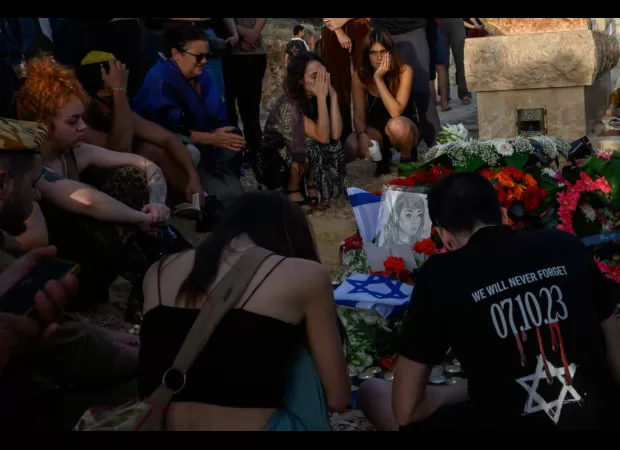Being a British Jew has been incredibly difficult since October 7 and I want people to understand that.
I cannot assume my safety in this country - a frightening reality.

October 7th was a day that will forever be etched in the hearts and minds of the Jewish community. It was a day that brought unimaginable pain and suffering, and changed the lives of Jews around the world. On what should have been a joyous celebration of the festival of Simchat Torah, a day spent with loved ones, news of a horrific tragedy began to spread.
As I sat in my mother's house, enjoying a peaceful Sabbath, the tranquility was shattered by the news that a terrorist organization, Hamas, had launched a brutal attack on Israel. They had broken through the border and infiltrated border towns, causing death and destruction in their wake. The images and videos that emerged from the attack were beyond horrifying- homes burned to the ground, families torn apart, and innocent lives taken. The United Nations even confirmed reports of Israeli women being raped and assaulted. It was a carefully planned and targeted massacre, the deadliest day for Jews since the Holocaust.
Despite the overwhelming evidence, there were those who sought to downplay or even deny the atrocities committed by Hamas. It was a heartbreaking blow to the Jewish community, who not only had to cope with the trauma of the attack, but also had to defend themselves against those who refused to acknowledge the truth. As Israel launched a response to the attack, Jews became targets of hate and discrimination.
The aftermath of the attack has left many of us living in a state of fear and anger. The rise of anti-Semitism in the UK has forced us to consider leaving the place we call home. I, for one, have been afraid to speak out about the ongoing conflict in Israel, but I can no longer remain silent about the way Jews are being treated in the UK.
It is important to remember that British Jews are not responsible for the actions of the Israeli government or terrorist organizations like Hamas. Yet, we are being held accountable and targeted for simply being Jewish. The levels of anti-Semitism have reached alarming heights, with the Community Security Trust recording over 4,000 anti-Jewish hate incidents, two thirds of which occurred after October 7th. Even more concerning is the fact that anti-Semitic hate crimes in London have increased by 1,350%.
Every week, we see protests and demonstrations in major cities, some of which have turned violent and led to arrests. It is disheartening to see that these protests are often filled with hateful rhetoric and symbols, such as swastikas. As Michael Gove stated, these protests attract a mix of people- some driven by a desire for peace and others promoting hate. What is even more concerning is that this hatred is not being called out loudly enough by those participating in the protests.
The fear of violence has seeped into our daily lives. My husband, who wears a kippah, has always been proud to display his Jewish identity on his daily commute to work. However, lately, he has encountered hostility and even received death threats. We have both experienced the discomfort of being in public spaces and wondering if the person across from us harbors anti-Semitic views.
This fear and hatred have also affected students on university campuses. Jewish students have reported feeling isolated and pressured to hide their Jewish identity due to protests and comments from their peers. This is not the welcoming and inclusive environment that universities should strive for.
The events of October 7th have left a lasting impact on the Jewish community. It is a day that we will never forget, and the trauma and fear still remain eight months later. But we refuse to be silenced. We will continue to speak out against hate and discrimination, and we hope for a future where Jews can feel safe and accepted in their own country.
October 7th was a day that will be etched in the minds and hearts of Jewish people forever. It was a day that changed everything, not just for those in Israel, but for Jews all over the world. It was a day of celebration, Simchat Torah, a day typically filled with joy and family gatherings. But on this particular day, the peace was shattered by the news of a terrorist attack on Israel by the notorious organization, Hamas.
As I sat in my mother's house, enjoying a peaceful Sabbath, the news began to trickle in about the horrific events unfolding in Israel. Reports, videos, and images from Hamas body cameras showed the brutal and violent nature of the attack. Homes were set on fire, parents were killed in front of their children, and innocent families were mercilessly shot. The UN even confirmed that Israeli women were raped and assaulted in this planned and targeted massacre. It was, without a doubt, the deadliest day for Jews since the Holocaust.
Even now, eight months later, the pain and hurt from that day still linger. But what hurts even more is the fact that there were people who tried to downplay or deny the attack. It's a painful reality that Jews are now forced to prove the validity of the horrors inflicted by Hamas, even as they continue to face increasing hatred and antisemitism online.
The violence by Hamas should have been universally condemned, but instead, as Israel launched its response, Jews were targeted with hate. This ongoing crisis of antisemitism in the UK has left many of us feeling fearful and angry, to the point where some are even considering leaving the country that we once called home.
Since the attack, I've been hesitant to speak out online about the Israel-Palestine conflict. But I can't stay silent about how Jews in the UK are feeling right now. We should not be held responsible for the actions of the Israeli government, Hamas, or the war in Gaza. It should be common sense, but unfortunately, levels of antisemitism in the UK have risen dramatically. In 2023, there were over 4,000 anti-Jewish hate incidents recorded by the Community Security Trust, with two-thirds of them occurring after October 7th. And in London, antisemitic hate crimes were up 1,350% in late October last year, according to the Met Police.
Every week, we see protests in major cities, some of which have resulted in arrests for hate-related crimes. It's disheartening to see people holding signs with swastikas or making racist remarks towards counter-protesters. As Michael Gove wisely said, "Many of those on these marches are thoughtful, gentle, compassionate people - driven by a desire for peace and an end to suffering. But they are side by side with those who are promoting hate." And it's disheartening to see that these hateful actions are not being called out loudly enough by those on the marches.
It speaks volumes that during one of these protests, officials in Hyde Park covered up the Holocaust Memorial and stationed police in front of it as a precautionary measure. And as a result, many Jews, including myself, now feel like central London is a no-go zone for us on Saturdays. We never know who we might encounter as we walk the streets, and it was shocking to see a protest outside a cinema in a predominantly Jewish area of North London that was showing a film about the October 7th attacks.
But the fear and violence don't just stop at protests. In February of this year, Rabbi Zecharia Deutsch, the Jewish chaplain at the University of Leeds, reported receiving death threats against himself and his family because he had previously served in the military. And on a building for Jewish students, the phrase "Free Palestine" was scrawled, causing many students to feel isolated and like they have to hide their Jewish identity. This has become a sad reality for many Jewish students at universities all over the UK.
The fear of violence has become a part of our daily life. My husband and I are proud British Jews, but we also fear for our safety. My husband wears a kippah on his daily commute to work on the London Tube. And although most of the time, he can travel safely, there are moments, like the one where a man sat across from him wearing a badge that read "Intifada until victory," that make us feel vulnerable. The word "intifada" means "uprising" in Arabic, but it has been hijacked by Hamas and their supporters to incite terror attacks against Israel. And in the past eight months, we've seen an increase in calls to "globalize the intifada," urging for armed resistance against Israel and its supporters.
It's a sad and scary reality that many Jewish people are facing in the UK right now. But we will not be silenced. We will not hide our Jewish identity. We will continue to stand up against hate and speak out against injustice. And we hope that one day, we will be able to walk the streets of our home without fear.






